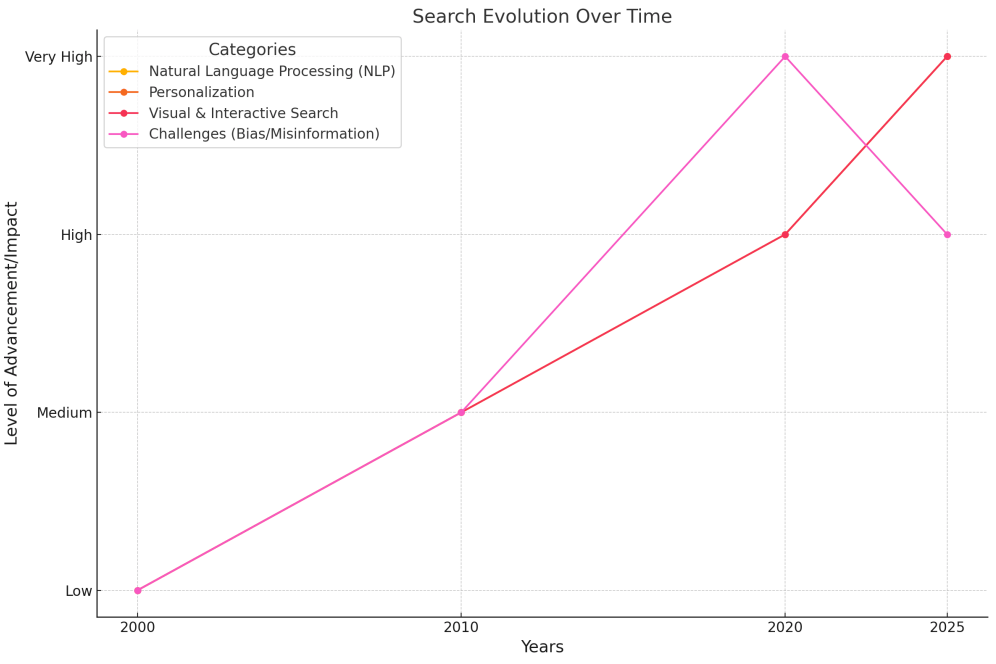
The way we discover and interact with information is undergoing a remarkable transformation. In 2025, search technology is evolving at an unprecedented pace, redefining how we navigate the vast digital landscape. This evolution marks the dawn of a new era in information discovery—one that promises to be more intuitive, personalized, and dynamic than ever before. As artificial intelligence (AI) and machine learning continue to shape our world, search is no longer just about retrieving data. It’s becoming a gateway to understanding, empowering individuals and communities to connect with knowledge in ways we’ve never imagined.
From Keywords to Conversations: The Shift to Natural Language
Gone are the days when users had to distill their thoughts into simple, disconnected keywords to find relevant information. In 2025, search engines have become conversational partners, understanding natural language and responding to queries as if they were engaging in a real dialogue. This shift is powered by advanced natural language processing (NLP) and machine learning models that can interpret context, tone, and intent with remarkable precision.
Imagine planning a vacation: instead of typing “cheap hotels Paris,” you can ask, “Can you recommend some affordable yet stylish places to stay in Paris near museums?” The search engine not only deciphers the nuances of your preferences but may even follow up, asking, “Do you prefer boutique hotels or larger chains?” It’s as if search has evolved from a static tool into an interactive guide capable of holding meaningful exchanges.
But it’s not just travel. Conversational search is revolutionizing industries like healthcare, where users can ask, “What are the symptoms of seasonal allergies, and how can I treat them naturally?” The system responds with tailored advice and resources, saving users time while delivering more relevant, accurate results. This transformation brings us closer to a world where digital tools are as approachable as human experts, bridging the gap between human thought and machine intelligence.

This graph illustrates the evolution of search technologies over time across four key categories: Natural Language Processing (NLP), Personalization, Visual & Interactive Search, and Challenges related to bias and misinformation. Each line shows the progression of impact/advancement from 2000 to 2025. Let me know if you need further adjustments or additional visualizations
Smarter Results Through Context, Intent, and Personalization
Search engines in 2025 have transcended the task of matching words to results. Instead, they understand the why behind every query by analyzing intent, context, and even the subtleties of user behavior. These systems don’t just interpret what you type—they intuit what you mean.
For example, a search for “best hiking trails” in the past might have yielded generic lists. Today, algorithms factor in your location, recent searches, activity preferences, and even the current weather to provide a curated list tailored to your needs. If you’re based in Seattle and prefer easy hikes, your results might feature nearby beginner trails and live updates about trail conditions.
Beyond this, search engines are becoming deeply integrated into our daily lives. Imagine receiving reminders like, “Your anniversary is coming up; would you like me to suggest some romantic restaurants or gift ideas?” Or discovering career opportunities that align with your skills because the engine understands your professional goals.
Of course, personalization also raises important questions about privacy and ethics. While tailored results can be transformative, they require access to personal data. How do we strike a balance between convenience and maintaining control over our digital footprint? By fostering transparency and offering users control over their data, search engines can ensure personalization remains empowering, not invasive.
The Rise of Visual and Interactive Search
The way we consume information is shifting from text to rich, multi-sensory experiences. In 2025, search results are no longer limited to static text links. They incorporate visuals, videos, and interactive elements designed to cater to a diverse range of learning styles.
Take a recipe search, for instance. Instead of a simple list of instructions, you’re presented with an immersive experience: a video guide for each step, alternative ingredient suggestions for dietary restrictions, and a visual shopping list you can sync directly to your favorite grocery app. Similarly, educational queries now offer interactive timelines, augmented reality (AR) simulations, or 3D models. Searching “history of the Roman Empire” might bring up a clickable, animated map that tracks the empire’s expansion and decline over centuries.
Even retail has been revolutionized. Visual search tools enable users to snap a photo of a product and instantly find similar items online. Augmented reality lets you “try on” clothes or preview how furniture would look in your living room—all without leaving your home. These innovations make search more accessible and engaging, bridging the gap between the digital and physical worlds.
Navigating the Challenges of Advanced Search
As search engines grow smarter, the challenges surrounding their use become more complex. One of the greatest concerns in 2025 is the spread of misinformation. While algorithms can be powerful tools for delivering accurate, relevant results, they are not infallible. In some cases, they can amplify false information or perpetuate biases that already exist within the data.
For example, a user searching for “climate change facts” might unknowingly be directed to echo chambers that align with their pre-existing beliefs rather than objective sources. Similarly, misinformation in health-related queries can have life-threatening consequences. To address these risks, search engines are developing safeguards, such as fact-checking tools and indicators that flag potentially unreliable content.
However, the responsibility doesn’t rest solely on the technology. Users themselves must adopt critical thinking habits—cross-checking information, seeking diverse perspectives, and questioning sources. Education plays a key role in equipping people with the skills to navigate this evolving landscape responsibly. As search becomes more advanced, the partnership between technology and informed users will be critical in ensuring its benefits outweigh its risks.
Shaping the Future of Knowledge and Connection
The evolution of search in 2025 isn’t just about finding information faster—it’s about deepening our connection to knowledge and empowering individuals to make better decisions. By blending personalization, interactivity, and contextual intelligence, search engines are unlocking opportunities that were once unimaginable.
Imagine a student in a remote village accessing world-class educational materials through interactive search tools or a small business owner using advanced insights to reach their ideal audience. These innovations are not only enhancing convenience but also driving social progress by making knowledge accessible to those who previously faced barriers.
At the same time, the rise of conversational and interactive search fosters a sense of connection in a digital age. When tools feel intuitive and human-like, they become less intimidating and more inviting, encouraging people to explore, ask questions, and engage with the world around them.
But with this great potential comes great responsibility. As users, developers, and regulators, we must approach these advancements thoughtfully, ensuring they serve as tools for empowerment rather than manipulation. By embracing this future with caution and intention, we can unlock a world where knowledge is not only accessible but also deeply enriching and profoundly transformative.
A Gateway to Understanding
In 2025, search is no longer just a tool—it’s a gateway to deeper understanding, connection, and growth. It empowers us to navigate an ever-expanding digital universe with ease and clarity, making knowledge more accessible and engaging than ever before. However, as search continues to evolve, it’s up to all of us to approach it with mindfulness and curiosity, ensuring it serves as a force for good.
This new era of search is more than a technological milestone—it’s a reimagining of how we engage with information. By embracing innovation responsibly, we can shape a future where knowledge is not just within reach but tailored to inspire, enlighten, and transform.
What do you think about the future of search and the role it plays in our lives? Do you have questions, thoughts, or insights you’d like to share? Leave your comments below—we’d love to hear your perspective and continue the conversation about this exciting journey into the future of information discovery!

Search technology in 2025 is changing how we find and interact with information, making it more personalized, intuitive, and engaging. Here’s a summary in my own words:
Search engines have shifted from simple keyword searches to understanding natural language, making them feel more like conversation partners. For instance, instead of typing “cheap hotels Paris,” you can now ask, “What are some affordable, stylish hotels near museums in Paris?” The search engine not only understands your preferences but might even ask follow-up questions to refine the results further. This makes searching easier and more personalized, whether you’re planning a trip, seeking health advice, or exploring hobbies.
Another big change is how search engines understand context and intent. Instead of just matching words, they analyze your location, preferences, and past activity to provide tailored results. For example, if you search for “best hiking trails,” it might show beginner trails near your area and even factor in the weather. This personalization can save time and make search results more relevant, but it also raises privacy concerns since it requires access to personal data. Finding the right balance between convenience and data privacy is crucial.
Search is also becoming more visual and interactive. Instead of plain text, you now get videos, interactive guides, and augmented reality features. For example, a recipe search might show step-by-step videos and shopping lists, or a furniture search could let you preview how items look in your home using AR. These features make learning and shopping more engaging and accessible.
However, advanced search technology also faces challenges like misinformation and bias. Algorithms aren’t perfect and might amplify false information or reinforce existing biases. This means users must stay critical by fact-checking and seeking diverse sources. Search engines are working on tools to flag unreliable content, but education and awareness are equally important for responsible use.
Overall, the future of search is exciting because it’s making knowledge more accessible and interactive, while also helping people make better decisions. It’s not just about finding information anymore—it’s about creating a deeper connection with knowledge. At the same time, it’s important for everyone—developers, users, and regulators—to ensure that these advancements are used responsibly, so they empower people without compromising privacy or spreading misinformation.
What do you think about these changes? Are you excited about the future of search, or do you have concerns about its impact on privacy and accuracy?
Hi Shawn,
Visual and interactive features like AR and video-guided content can make searches more engaging and accessible. These tools are helpful for learning new skills and visualizing products before buying. There are real concerns about misinformation and bias in search algorithms. Efforts to mark unreliable content are underway, but education and awareness are still important for responsible use.
As search technology grows, developers and regulators should focus on transparency and user control. Don’t you agree? This helps protect privacy and limits exposure to harmful content. It’s also important to consider how search engines can better address misinformation and build trust with users.